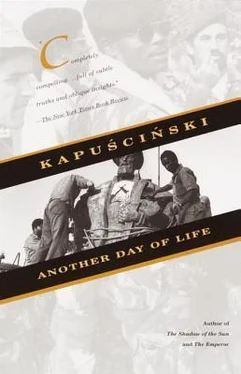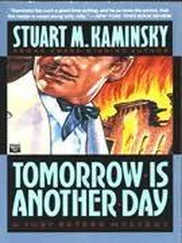BYE
Somebody pounded on my door at two in the morning. I snapped out of a deep sleep, and the flesh stood up on the back of my neck because I thought: FNLA!
I trudged on leaden legs to open the door. Three incredibly filthy types tumbled into the room. They threw themselves on me and I threw myself on them and we started hugging and shouting — it was Nelson, Manuel, and Bota! They laid their weapons on the floor and wanted to wash. Then Nelson dived onto the bed and fell asleep in a second, while the others started opening the one can of meat that I’d been saving for my hour of need.
What’s going on at the southern front? I asked.
There is no southern front, Manuel said; they’re already outside Benguela. The second column is headed for Luanda.
Can’t they be stopped?
That’s a tough one. They command enormous firepower. They have a lot of armor, a lot of artillery, they fight well, and they’re determined. We have nothing to fight with. Our men aren’t prepared to stand up to a regular army. We’re withdrawing because the forces are unequal.
What about Farrusco?
We don’t know; he was badly wounded.
Did you see them close up?
Yes. They have Panhard armored personnel carriers, very fast. They’re mobile and they know the terrain well. They split up into groups of five or six vehicles and keep changing positions. They’re everywhere and nowhere, and it’s hard to catch them. We don’t have the resources to organize a defense.
When will they get to Luanda?
In a few days, perhaps.
The pessimistic side of my nature suggested that the moment of annihilation had come and the end was approaching. All they would have to do was take the power plant at Cambamba, close to two hundred kilometers from Luanda. Electricity runs from there to the pumping station; whether the city has water or not depends on that power plant. Without water and light, the surrounded and starved city would have to lay down its arms after a few days.
MONDAY, NOVEMBER 3 (JUDGMENT DAY)
Morning — nothing.
Noon — Pablo comes for me in the jeep at the assigned point. There are two more Cubans with him. They are wearing green fatigues with no insignia. The only distinguishing mark is the weapons on their shoulders. Nobody asks an armed man what he is doing. As soon as he says “Cubano,” the patrols run out of questions and he can drive on. We pass an industrial park thrown up in the fields. Then the pastures — regular, well-maintained rectangles of succulent grass — begin. Herds of stray cows: tons of meat and milk, with nobody watching them. There is hunger in the city, but nobody bothers the cattle — this is Portuguese property, untouchable. A short way down the road, gentle hills begin, heaps of earth, lines of entrenchments, artillery, tents, crates — the northern front, the soft underbelly of the war because these are the approaches to Luanda. The view from the first line of trenches: the countryside spread out green, a river in a shallow valley, an asphalt road, a blown bridge, the shot-up pumping station, a palm grove. On the other side, in the distance, a sunlit hill, the enemy’s fortifications. Through the lenses of powerful binoculars I can see specks of dust and horizontal and vertical scales; figures are running back and forth, and vehicles are moving along the horizontal scale: preparations for an attack. On the side where we are, there is also a great deal of movement, sandbags are being passed about, outposts camouflaged, artillery shunted. They don’t want to be taken by surprise. Then come night, dawn, and waiting — who will strike first? Someone finally does strike, the other side replies, dust rises from the earth, the dance of fire and death begins. Pablo walks around giving orders and checking supplies like a boy with candles on Christmas Eve. I walk behind him, taking pictures. They all want to be photographed. Me now, me now, camarada, me, meeeeeeeeee! They stand rigidly and some of them salute. To leave a trace, to fix themselves, to remain somehow. I was here, just yesterday I was here, he took a picture, yes, that’s how I looked. That’s the kind of face I had as a live man. I stand before you at attention: Look at me for a moment before you turn to something else.
Afternoon — we were on our way back to the city, when the jeep drove down a side street and stopped in front of a one-story villa where the Cuban advisers had their headquarters. We had barely managed to sit down when a soldier ran in and handed Pablo a sheet of paper torn out of a notebook with a message written on it in pencil.
Pablo read it and went pale.
Without a word, he went out onto the veranda and sat down on a bench. He took out a handkerchief and began wiping his forehead. We waited for him to say something. He read the message again and remained silent, until at last he said quietly, indistinctly, as if his mouth were stiff:
“They captured Benguela today. All the Cubans died in the fighting for the town. Word was sent by a wounded signalman.”
Then he looked at us and added:
“Now they’re on their way to Luanda. It’s six hundred kilometers from Benguela to Luanda, but there are no strongpoints or defensive lines along the way. If those are gutsy boys and they decide to drive night and day, they can be here tomorrow.”
In the next house a woman called out “Mauro! Mauro!” After a moment, a child’s voice answered. It was 6 P.M. The Angelus sounded somewhere far off.
“Get me the radio operator,” Pablo said to the soldier who had brought the message. “And dismiss the men.”
Military matters were beginning, so I withdrew and went to the hotel. I asked someone to drive me to the edge of the city, to Morro da Luz, where the MPLA headquarters was located in the former residence of the French consul. But the staff was meeting and the sentry didn’t want to admit me. I went back in a truck carrying Portuguese soldiers. These were troops in a state of utter dissoluteness. They wore long beards and had neither caps nor belts. They were selling their rations on the black market and breaking into cars. Their orders were to maintain neutrality, not to shoot, not to get involved. They were loading everything onto the ships. The last unit was to leave in a week.
In the evening I spoke with Queiroz. He thinks Luanda will be hard for them to take, because the whole populace will fight and they will have to decide on a mass slaughter that the world might not tolerate. But then he began to have doubts himself: “In the end, how can I know? The world is so far away.”
Ruiz flies the plane to Porto Amboim, carrying a group of sappers and some crates of dynamite. They are to blow all the bridges on the Cuvo River, which will cut the road between Benguela and Luanda. If they make it.
Warsaw calls at midnight.
THE SITUATION IN ANGOLA [I sent] HAS TAKEN A DRAMATIC TURN IN THE LAST TWENTY-FOUR HOURS. THE SOUTH AFRICAN ARMY, SUPPORTED BY UNITS OF MERCENARIES AND THE FNLA AND UNITA, HAS OCCUPIED BENGUELA, THE SECOND LARGEST CITY IN ANGOLA. THESE TROOPS ARE PROCEEDING IN TWO STRONG ARMORED COLUMNS TOWARD THE CAPITAL, WHERE THE DEFENSE OF THE CITY IS BEING ORGANIZED. ACCORDING TO STILL UNCONFIRMED REPORTS JUST RECEIVED HERE, ONE OF THESE COLUMNS HAS OCCUPIED NOVO REDONDO AND IS THREE HUNDRED MILES SOUTH OF LUANDA. IF THESE TROOPS CANNOT BE STOPPED AT THE LINE OF THE CUVO RIVER THEY COULD BE AT THE APPROACHES TO LUANDA WITHIN THE NEXT TWO DAYS. IT IS ANTICIPATED THAT A SIMULTANEOUS ATTACK WOULD THEN BEGIN FROM THE NORTH AND THE SOUTH IN ACCORDANCE WITH PLAN ORANGE, WHICH CALLS FOR THE OCCUPATION OF THE CAPITAL BEFORE NOVEMBER 10. THIS WOULD MEAN THE POLITICAL AND MILITARY LIQUIDATION OF THE MPLA, AT LEAST IN THE SHORT TERM END ITEM.
FRIENDS, CALL ME IN SEVEN HOURS BECAUSE THIS IS THE DECISIVE MOMENT, OK?
Читать дальше











